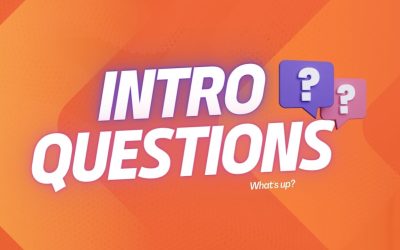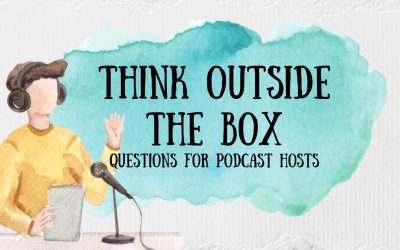As a host, you have the power to unlock the secrets of your guest’s success and share their insights with the world. But where do you start?
In this article, we’ll explore some career questions that are guaranteed to make your podcast shine brighter than a disco ball at Studio 54.
So grab your mic, your bell-bottoms, and let’s get groovy.
Ps: if you’re struggling to get your podcast off the ground, don’t worry – we’re exclusively offering an incubation program to help you take your show to the next level, grab your seat now!
The importance of asking career questions:
It’s not enough to simply chat with your guest about their life or their latest project. Asking career-related questions can provide a deeper insight into their experience and provide more value to your audience. By asking targeted questions about their career, you can uncover the challenges they faced, the lessons they learned, and the strategies they used to succeed.
The Types of questions:
-
Questions to ask about their early career experiences and how they got started in their field
-
Questions about the biggest challenges they faced in their career and how they overcame them
-
Questions about the role of mentors in their career and how they found them
-
Questions about their biggest accomplishments and how they achieved them
-
Questions about their current work and what they hope to achieve in the future
Podcast career Questions:
What inspired you to pursue this career path?
Starting with this question allows your guest to share their story and give context to their career trajectory. It also provides a relatable introduction that can help establish a connection with your audience.
What do you consider to be your biggest career accomplishment?
This question highlights your guest’s achievements and allows them to showcase their expertise. It’s a great way to build credibility and establish the value of the conversation early on.
What have been some of the biggest challenges you’ve faced in your career, and how did you overcome them?
Asking about challenges and setbacks allows your guest to share their experiences and offer advice for your audience. It also humanizes your guest and demonstrates that success doesn’t come without its share of obstacles.
What advice would you give to someone just starting out in this career field?
This question can offer valuable insights for your audience and help guide those who are just starting out. It can also give your guest a chance to reflect on their own journey and share some wisdom.
What do you see as the future of this career field?
Asking about the future can provide your audience with valuable information about where the industry is headed and what opportunities might be on the horizon. It can also give your guest a chance to share their vision and offer insights into emerging trends.
How do you stay up-to-date on industry trends and developments?
Asking this question can help your audience learn more about the resources and strategies that successful professionals use to stay informed and competitive. It can also provide an opportunity for your guest to share their favorite industry publications, events, and networking strategies.
What do you think are the most important skills for success in this career field?
This question can offer valuable insights for your audience and help guide them as they pursue their own career goals. It can also provide an opportunity for your guest to reflect on their own experiences and share the qualities they believe have contributed to their success.
Other examples:
- What’s the best advice you can give someone to help plan a career rather than simply work to keep a job?
- Tell me about a recent business setback and how you recovered?
- What factors do you consider most often when planning for the future?
- Was there ever a role you applied for and landed, but weren’t 100 percent qualified for? If so, how did you proceed?
- What are you trying to accomplish this quarter?
- Can you tell me about a time when you had a difficult boss? How did you handle the situation?
- What’s the one question you wished you asked earlier?
- How did you learn to address a group of people eloquently?
- What does an average week look like for you?
- Can you recommend a book or resource for dealing with difficult conversations?
- Are there any expectations you had about this career path that you have found differ from reality, in both good or bad ways?
- What practices can you recommend for those that get nervous whenever they are addressing a group of people?
- What don’t you like about your job, what are the biggest challenges and compromises?
- What current issues and trends in the field should I know about or be aware of?
- What steps would you recommend for someone preparing to enter this field?
- What’s a good tool for project management and tracking team commitments?
- What skills are crucial to succeeding in this career?
How to ask questions that lead to engaging and informative answers:
Asking the right questions is crucial to getting engaging and informative answers during an interview or conversation. Here are some tips on how to ask questions that will lead to engaging and informative answers:
Start with open-ended questions
Open-ended questions are questions that can’t be answered with a simple “yes” or “no.” They require the person being interviewed to provide more detailed answers, which can lead to a more engaging conversation. For example, instead of asking “Do you like your job?”, ask “What do you enjoy most about your job?”
Use follow-up questions
Follow-up questions are a great way to dive deeper into a topic and get more detailed information. For example, if someone mentions a project they’re working on, ask follow-up questions like “What inspired you to work on that project?” or “What challenges have you faced while working on that project?”
Ask about experiences
Asking about experiences is a great way to get personal and engaging answers. For example, instead of asking “What skills do you have?”, ask “Can you tell me about a time when you had to use your skills in a challenging situation?”
Avoid leading questions
Leading questions are questions that suggest a particular answer. They can influence the response and lead to a less authentic conversation. For example, instead of asking “Don’t you think your job is stressful?”, ask “How do you manage stress in your job?”
Be prepared but flexible
It’s important to be prepared with questions in advance, but don’t be afraid to deviate from your list if the conversation takes an interesting turn. Be flexible and willing to adjust your questions based on the flow of the conversation.
.
Conclusion
To sum it up, asking great questions is key to creating an engaging and informative podcast. With a little preparation and the right approach, you can lead your guests to provide insightful answers that will captivate your audience. So, get ready to unleash your inner interviewer and take your podcast to the next level!
Be sure to check out our other post on “The Ultimate Guide to Narrative Podcasting” to take your podcasting skills to the next level and craft compelling stories that keep your listeners hooked from start to finish.






0 Comments